Poor earnings blamed for destructive fishing practices

By Luisa Maria Jacinta C. Jocson
FISHING PRACTICES that damage the environment are a warning that coastal communities require a sustainable source of livelihood, which the government needs to invest in instead of penalizing such practices, according to the founder of an investment fund that provides capital to enterprises focused on poverty alleviation.
“Simply penalizing (fishermen) does not solve the problem completely since the root of the problem lies in… being unable to make a decent living. I refuse to believe in the idea that the Filipino fishermen are lazy. They’re not. They’re just trying to make a decent living,” Ignite Impact Fund Founder Maria Antonia G. Arroyo said in a virtual interview.
“There is a need to invest in things like mariculture and for the private sector to step in, since we often talk about how expensive it is to do this. However, there are a lot of deeply valuable assets in the Philippines. For example, mariculture is a great opportunity so that more jobs can be created in coastal communities… in the most environmentally sustainable way possible, so you certainly need cooperation (with) local governments,” she added.
Ms. Arroyo said that the implementation of Fisheries Management Areas (FMAs) is a “step in the right direction” by helping local government units manage illegal fishing.
“FMAs address the four kinds of illegal fishing: dynamite fishing, cyanide fishing, the use of ‘hulbot hulbot’ (destructive fishing gear built with nets connected to sinkers), and commercial fishing vessels in municipal waters,” she said.
“Due to commercial fishing vessels occupying municipal waters, (fishermen) resort to dynamite fishing to earn more as it is very effective for collecting fish at a fast rate but ultimately harmful to the environment,” she added.
She said the industry suffers annual losses of P1.8 billion from illegal and unreported fishing.
“Seventy percent of the waters are overfished, which is really terrible, as 60% of Filipinos live in coastal areas. Fishing is a big thing in terms of policy implementation,” Ms. Arroyo said.
“Dynamite fishing and other illegal forms of fishing are a result of desperation, lack of moderation, appropriate technology, boats, nets, and a lack of conservation and investment,” she said.
Ignite Impact Fund supports “companies with good business models for coastal communities. What we like to do is find companies that are already willing to work with nongovernmental organizations (NGOs) who already have communities with small-scale fishers,” Ms. Arroyo said.
“You’re actually providing management skills and leaving the community to do what they do best, which is farm or to fish,” she added.
The fund has invested in Plentina, a fintech that provides “buy now, pay later” store credit with major retailers for essentials and builds a credit score for the user; and BioPrime, a maker of organic soil conditioner that increases crop yield and decreases inorganic fertilizer use by 50%.
One of the sustainable solutions the fund is looking into is coral farming, which could be another source of livelihood for fishing communities.
“Everywhere around the world there are corals that need to be reforested and there is a $1.5 billion market for sustainable coral for aquariums. Farming coral is very easy and all you have to do is not to touch it. You can use microfiber fragmentation to make the coral grow 50 times faster and you can grow them on shore so that you will have consistent Ph and water temperature. Seventy percent of the coral can be used to revitalize the reefs and 30% can be sold to the aquarium market and then you have an extra market for the fisherfolk,” she said.
For other small-scale fishermen, the Ignite Impact fund is also looking at programs that provide them with backyard farms that can work on in the day. Much fishing activity takes place at night.
“For as low as P2,000 per family, you’re giving them food security so they don’t go hungry, and all the surplus they sell at local markets, so it’s building local markets and community services,” Ms. Arroyo said.
In terms of government aid, Ms. Arroyo said that investment is key to helping the sector flourish.
“Subsidies are never sustainable financially. What the government should be doing is reaching out. If they really want to help the farmers, then they need to (address) the demand side to get more people investing in mariculture and coastal communities,” she said.
“I really think that destructive or illegal fishing is the symptom and the cure is to get more investors. It’s really about better management and closer cooperation with the government in terms of getting people to invest,” she added.



